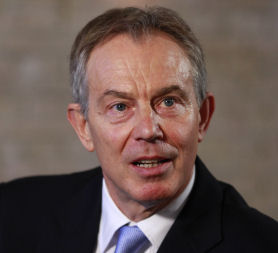Does Blair know Iraq Inquiry members?
Updated on 12 January 2010
Key links between Tony Blair and members of Sir John Chilcot's Iraq Inquiry panel have been highlighted by Channel 4 News' "Who Knows Who".

The network of connections is outlined as Blair prepares to give evidence to the five-member committee within the next few weeks.
Read more from Who Knows Who
Perhaps the most interesting link occurs between Blair and committee member Sir Lawrence Freedman.
In 1999, Freedman was invited to help shape "a philosophy that Blair could call his own" on foreign affairs, wrote former New Statesman editor John Kampfner, in his book Blair’s Wars.
Writing in his Daily Mail column, Kampfner claims that Blair's Chief of Staff, Jonathan Powell, contacted Freedman and asked him to propose a strategy for the prime minister.
This input was said to have preceded the "doctrine of the international community" Blair announced in his famous speech to the Economic Club in Chicago in 1999.
Given during the time of the Kosovo war, the doctrine - now often referred to as "Blair's doctrine" - set forward an argument for the international community to intervene militarily in other countries to prevent humanitarian disasters and achieve regime change.
Freedman, a professor of War Studies at Kings College, was also commissioned to write a book by Blair's Cabinet Office, an official history of the Falklands War in 2005.
An inquiry spokesman said Blair may well have read a foreign policy paper written by Freedman around the period of the Chicago speech, but suggestions of his direct involvement in providing policy ideas were overstated.
A fellow historian and Iraq Inquiry member, Sir Martin Gilbert, also has crossed academic paths with Mr Blair.
Gilbert, the official biographer of Sir Winston Churchill, claimed in 2004 that Blair and his United States counterpart George W Bush may one day be seen as akin to Roosevelt and Churchill for their actions in the Middle East.
He wrote in the Observer: "Although it can easily be argued that Bush and Blair face a far lesser challenge than Roosevelt and Churchill did - that the war on terror is not a third world war - they may well, with the passage of time and the opening of the archives, join the ranks of Roosevelt and Churchill."
It was also rumoured in November 2007 that Blair, during his final days at Downing Street, corresponded with Gilbert about ideas for writing his own prime ministerial memoirs.
An inquiry spokesman said that such is Gilbert’s standing as a biographer, it would not be unusual for the two to have discussed the subject. He said Gilbert’s comparison between Blair and Churchill was merely a prediction with caveats, not a judgement.
Sir Roderic Lyne, another inquiry panel member, was British ambassador to the Russian Federation from 2000 to 2004, while Blair was prime minister.
Perhaps a sign of the familiarity between the two camps was that Alastair Campbell, Blair's press secretary from 1994 to 2003, used to take part in running races against Lyne when the pair met up on diplomatic duties.
In 2003, Campbell took time out from a St Petersburg summit to race Lyne through six miles of city streets. This was the third in a series of races the pair had run in Russia.
Alastair Campbell appeared as a witness before the panel over his role in the dodgy dossier affair and the reasons Britain went to war in Iraq.
An inquiry spokesman said the pair were never regular or serious running partners, despite their Russian exertions.
Sir John Chilcot, chair of the panel, was knighted to the Order of the Bath on the 31 Dec 1997 after Tony Blair came to power in May earlier that year.
Chilcot was also appointed to an independent commission tasked with recommending an alternative to Westminster's 'first-past-the-post' voting system in 1997. The commission was set up by Tony Blair, prime minister at the time.
Baroness Prashar, the first civil service commissioner, was made a life peer under Tony Blair in 1999. She too sits on the Iraq Inquiry panel of five.
An inquiry spokesman said the award of a knighthood to Chilcot was standard practice for a departing permanent secretary as he had retired from the civil service that same year, and that Prashar's life peerage was a reflection of her significant contribution to public life. He said neither honour could be seen to have political motivations.
Prime minister Gordon Brown appointed the members of the committee, with opposition parties consulted.





